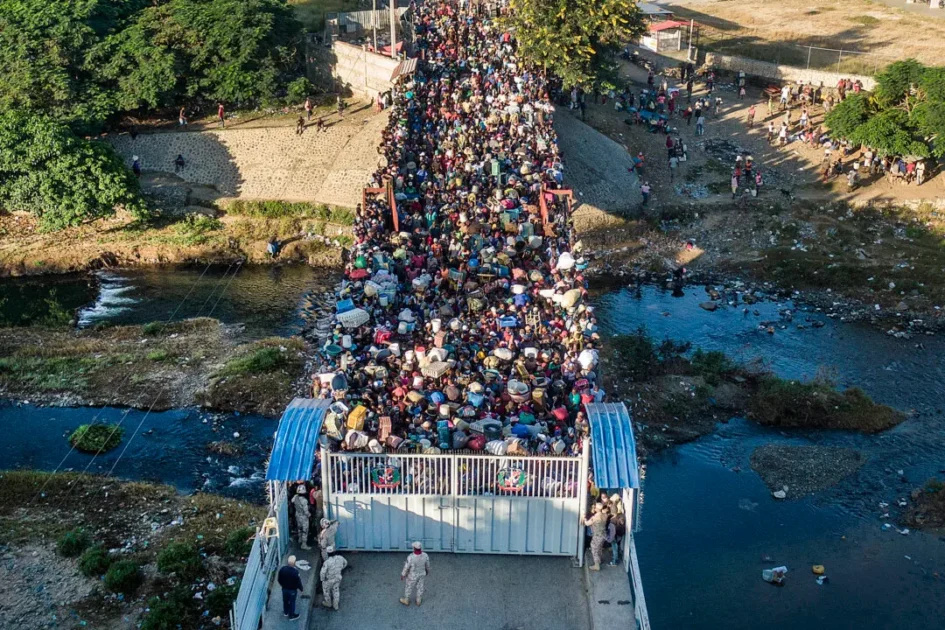The Dominican Republic government has made an alarming announcement that it will begin mass deportations of Haitian nationals, expelling up to 10,000 Haitians each week.
This decision comes amidst a growing migration crisis exacerbated by the worsening political instability and gang violence in neighboring Haiti. The Dominican Republic, which shares the island of Hispaniola with Haiti, is facing an influx of Haitian migrants seeking refuge from the turmoil in their home country, further straining relations between the two nations.
Government’s Decision and Rationale
Homero Figueroa, spokesperson for the Dominican Republic, revealed the government’s plans on Wednesday, stating that the administration had observed an “excess” of Haitian migrants.
According to Figueroa, the increasing number of Haitians crossing into the Dominican Republic has triggered the government’s decision to reinforce its immigration control measures. The move comes as a U.N.-backed security mission in Haiti, aimed at addressing the rampant gang violence, appears to be losing momentum.
While authorities have agreed to intensify surveillance along the border shared by the two nations, details on how this will be carried out remain unclear. The Dominican Republic, known for its tough stance on immigration, has long been a popular destination for Haitians escaping poverty, gang violence, and political instability.
However, this influx has caused tensions, leading to accusations of human rights abuses and strained diplomatic relations between the two countries.
The scale of the deportations is staggering. Last year alone, the Dominican Republic deported over 174,000 individuals it identified as Haitian nationals.
In the first six months of this year, at least 67,000 more Haitians have been expelled. With the government now ramping up its deportation operations to as many as 10,000 deportations per week, the figure is set to rise sharply.
For Haitians living illegally in the Dominican Republic, these deportations come as a severe blow. Many of them have been in the country for years, with some even having children born in the Dominican Republic.
The government’s hardline stance is seen by many as a violation of human rights, as mass deportations often target not only recent migrants but also those of Haitian descent who have lived in the Dominican Republic for generations.
Criticism and Human Rights Concerns
Activists and human rights groups have long raised concerns over the Dominican Republic’s treatment of Haitians and those of Haitian descent. They accuse President Luis Abinader’s administration of ongoing human rights violations, particularly against individuals who have lived in the Dominican Republic for decades or were born in the country but lack proper documentation. Despite these accusations, Abinader has consistently denied that any mistreatment is occurring, asserting that the government is merely enforcing immigration laws.
The mass deportations are likely to exacerbate existing racial and ethnic tensions between Dominicans and Haitians. The two nations have a long, complicated history marred by political disputes, racial division, and economic inequality.
Haitian migrants often face discrimination, exploitation, and xenophobia in the Dominican Republic, with many living in squalid conditions while working in low-wage sectors like agriculture and construction.
At the heart of this migration crisis lies the deteriorating situation in Haiti. The country is grappling with a wave of violence as gangs control approximately 80% of the capital, Port-au-Prince. The violence has displaced nearly 700,000 people, leaving them homeless, and forcing thousands of others to flee across the border. With the Haitian government struggling to restore order, many Haitians see no choice but to seek safety and opportunity elsewhere.
The U.N.-backed mission in Haiti, intended to curb the violence and restore stability, has thus far proven ineffective. Comprising nearly 400 police officers from Kenya, as well as a smaller contingent of officers from Jamaica and Belize, the mission has been criticized for lacking sufficient personnel and funding.
While the U.S. has been a key advocate for the mission, pushing for a larger U.N. peacekeeping operation, it has struggled to muster the international support needed to make a meaningful impact.
Dominican officials, including President Abinader, have expressed frustration with the mission’s shortcomings. In a recent address to the U.N. General Assembly, Abinader warned that if the mission fails, his government would be forced to take “drastic measures” to protect the country from the effects of Haiti’s instability. Wednesday’s announcement of mass deportations appears to be one of those measures, as the Dominican government grapples with the growing influx of refugees and migrants.

For many Haitians in the Dominican Republic, the prospect of deportation is a harsh reality that threatens to uproot their lives. Returning to Haiti means facing extreme violence, poverty, and political instability.
Gangs operate with near-impunity in many parts of the country, and basic services, including healthcare, education, and housing, are in disarray. The country’s economy has also been crippled, making it difficult for deported individuals to find jobs or access resources.
The decision to ramp up deportations also raises questions about the capacity of the Dominican Republic to process such a large number of individuals each week. With 10,000 deportations planned weekly, there are concerns that migrants may be denied proper legal representation, access to humanitarian aid, or a fair hearing to assess their refugee status. International human rights organizations are likely to put pressure on the Dominican government to ensure that due process is followed and that deportees are treated humanely.










Join our Channel...